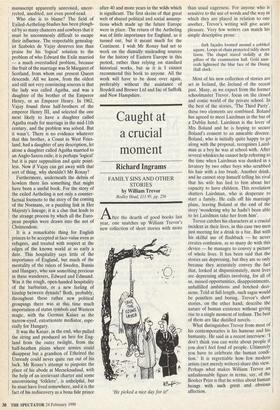Caught at a crucial moment
Richard Ingrams
FAMILY SINS AND OTHER STORIES by William Trevor
Bad1ey Head, £11.95, pp. 256
After the dearth of good books last year, one snatches up William Trevor's new collection of short stories with more 'He picked a nice day for it!' than usual eagerness. For anyone who is sensitive to the use of words and the way in which they are placed in relation to one another, Trevor's writing will give acute pleasure. Very few writers can match his simple descriptive prose:
. . . dark façades loomed around a cobbled square. Loops of chain protected tidily shorn lawns. The chapel stared stolidly at the pillars of the examination hall. Gold num- erals lightened the blue face of the Dining Hall clock.
Most of his new collection of stories are set in Ireland, the Ireland of the recent past. Many, as we expect from the former schoolmaster Trevor, focus on the closed and comic world of the private school. In the best of the stories, 'The Third Party', these two elements are combined. Boland has agreed to meet Lairdman in the bar of a Dublin hotel. Lairdman is the lover of Mrs Boland and he is hoping to secure Boland's consent to an amicable divorce. Boland, who is initially quite happy to go along with the proposal, recognises Laird- man as a boy he was at school with. After several whiskies he cannot help referring to the time when Lairdman was dunked in a lavatory by two other boys who scrubbed his hair with a loo brush. Another drink, and he cannot stop himself telling his rival that his wife has lied to him about her capacity to have children. This revelation shatters Lairdman, who is desperate to start a family. He calls off his marriage plans, leaving Boland at the end of the story 'wondering why he hadn't been able to let Lairdman take her from him'.
Trevor catches his characters at a crucial incident in their lives, in this case two men just meeting for a drink in a bar. But with his skilful use of flashback — he never creates confusion, as so many do with this device — he manages to convey a picture of whole lives. It has been said that the stories are depressing, but they are so only because they accurately convey the fact that, looked at dispassionately, most lives are depressing affairs involving, for all of us, missed opportunities, disappointments, unfulfilled ambitions and botched deci- sions. Told at full length, such sagas would be pointless and boring. Trevor's short stories, on the other hand, describe the nature of human existence without giving rise to a single moment of tedium. The best of them are like distilled novels.
What distinguishes Trevor from most of his contemporaries is his humour and his humanity. He said in a recent interview: 'I don't think you can write about people if you don't feel fond of people. Ultimately you have to celebrate the human condi- tion.' It is regrettable how few modern artists (not merely writers) share this view. Perhaps what makes William Trevor an unfashionable figure in terms, say, of the Booker Prize is that he writes about human beings with such great and obvious affection.


















































 Previous page
Previous page